This is the second entry in a series of articles describing the reasons why players backstab you in Diplomacy—and what you can do to reduce your chances of getting backstabbed!
Click here to read about reason #1, “You were Annoying.”
Reason #2: You fell for a Trojan Horse
Sometimes, you were not exactly stabbed in the back by an ally; you were tricked into thinking you had an ally in the first place. That is to say, the player who attacked you intended to backstab you from the start. Your rival falsified a Trojan Horse “alliance” with you so that you would lower your defenses against their planned attack. You were never their ally. You were their victim.
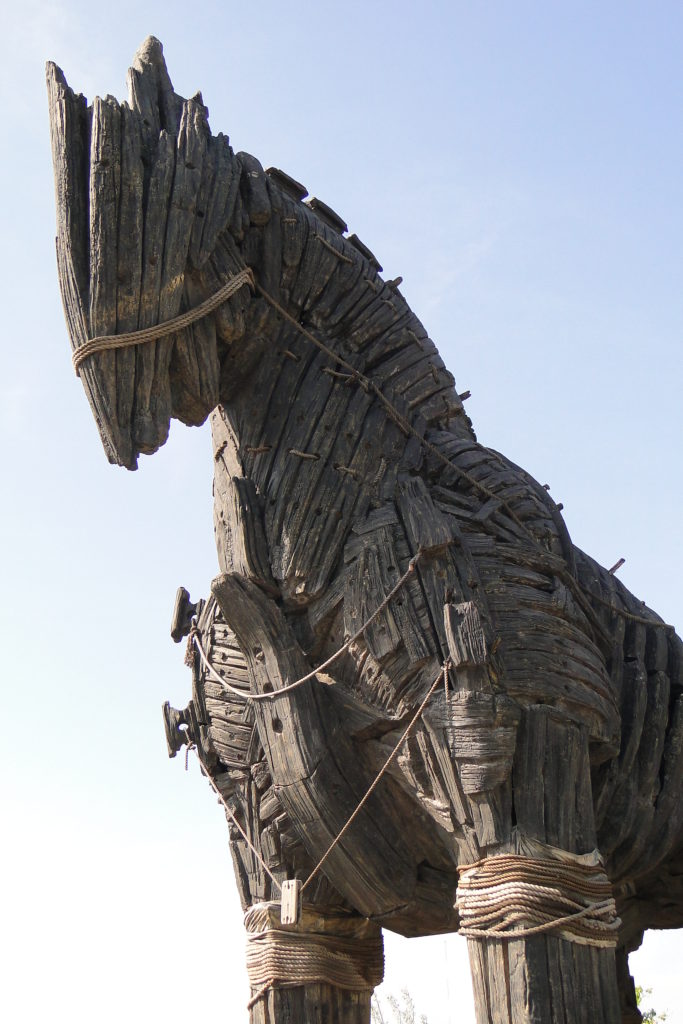
Like the legendary Trojan Horse, an offer of alliance may appear to be a gift…but in reality be a trap.
The Common Trojan Horses
Trojan Horse Duo Alliances
There are two common fake alliances: France’s faking an alliance with England and Italy’s faking an alliance with Austria.
Example #1: ODC 2019 Round 1, Game 28 (Preliminaries) (Mar 2019—Jun 2019)
In this match, I played as France. There are many good strategies for solo winning as France, but there is one that stands out above the rest: conquer great Britain first, then backstab Germany while stealing Tunis from Italy, then grind down the remaining northern centers to reach 18.
This strategy is effective for many reasons:
- As France, you can get into positions that make your solo win likely while controlling as few as 10 centers; players who haven’t read my article “Forget the Numbers Game” and/or who don’t understand how this strategy plays out will overlook how threatening France has become until it is too late.
- With the English home centers under your control, it will be difficult or even impossible for other powers to outflank you. You can put the English centers, Iberia, and your own home centers well behind your front line as you concentrate all your forces on offense.
- Once you can conquer Munich, Berlin and Tunis, your solo win may become inevitable. The Scandinavian centers are difficult to put behind a stalemate line, and if Russia doesn’t have the right unit composition in the right places (perhaps England or Germany shut northern Russia down earlier), you will inevitably grind down the centers needed to reach 18.
- You need very little direct cooperation from your neighbors or allies. To succeed with this strategy, you merely need Italy’s neutrality and discord between England, Germany and Russia. You do not strictly need any of these powers to coordinate their moves with yours; you just need to be free to make the attacks you want to make against England.
All things being equal, I will pursue this strategy as France. Most other French strategies share a serious weakness: you eventually have to attack England (it’s theoretically possible to win as France without attacking England, but that point is pedantic and not practical), and England is usually weakest at the beginning of the match. If you have to attack England to win, it is generally easier to attack while England is small and tender, rather than when England is large and tough. (To be clear, I have played the England-France alliance successfully and will do so again sooner or later; I simply think that a genuine England-France alliance makes it a bit more difficult for France to solo win.)
So with this plan in mind, I lied to England that I wanted to form an alliance. My offer of alliance was completely insincere; it was a ruse just to trick England into sending units east.
Some additional context: I also feigned a friendly posture with Germany, but Germany did not exactly take the bait. To keep Germany down, I promised to support Italy into Munich and then tried to manipulate Germany into leaving Munich open (this worked).
I began attacking England, as I intended, in Spring 1902. My plan hit a snag: Italy sent a few units to attack/harass me.
Like any decent Press Diplomacy player, I made lemonade out of this lemon. I apologized to England, and lied (again!) that I would honor our alliance agreement on the grounds that England had been trustworthy and Italy had not.
England decided to press on eastward while I dealt with Italy.
I understand, from what Italy told me, that Italy’s efforts to secure Germany and/or Austria as allies did not succeed. This can also be inferred from looking at the board: Italy’s moves imply that Italy expected (and did not receive) Germany’s support for Munich’s move to Burgundy; Italy helped Austria at Greece and moved an army out of the way to Naples, only for Austria to take Russia’s alliance offer and build a second fleet.
I wonder if Your Bored Brother had any influence on the board treating Italy (his one clear enemy) so indifferently…?
Anyways, Italy changed sides and joined forces with me against England:
At this point, I now considered by England and Italy my enemies; England for strategic reasons I already explained, and Italy for being unreliable (from my perspective, Italy ineffectively attacked me early on for no clear strategic reason, which I consider to be a sign of unreliability).
However, there was no reason for me to tell them that I considered them my enemies. I lied extensively to each of them about how I considered them my allies.
Above, on the map, you can see that England used the fleet at Norwegian Sea to cover Clyde. If England had not done that, Italy would have been able to swipe Liverpool. I actually warned England that Italy’s fleet would wind up in North Atlantic Ocean (Italy and I had agreed to do this; I promised to help Italy take an English home center in return for Italy’s cooperation). I talked out of both sides of my mouth this way mainly because I did not want Italy to benefit from my attack on England (my strategy calls for seizing Tunis from Italy shortly after England falls, so I needed all the English home centers to myself and for Italy to be kind of weak), but also because I wanted to do what I could to keep England treating me as an ally.
Finally, at the end of 3 years of lying to England about my desire to be allies, I ended the charade:
If Italy had not gotten in my way, I would have all-out attacked England in 1902. But 1903 was not too big of a delay.
From England’s perspective, my actions might have come across as repeated “backstabbing.” But the truth is, I had no intention of allying with England this match. I simply wanted my attack to be as effective as possible.
The story behind this example is sort of over now, but you probably want to know what happened next, right? Well, I did technically help Italy gain an English center, but I “changed sides” on the same turn and helped Germany regain Munich. Austria’s attack on Italy was going well, so I helped Germany for two strategic reasons: 1) to trick Germany into thinking that I was not going to attack; and 2) to make sure Italy was weak enough for me to seize Tunis around the time that I would attack Germany.
I encouraged war between Germany and Russia, in part by feigning alliance with both of them…
Thus, I achieved my early-game strategic goals by Autumn 1905. I controlled all of Great Britain and got away with a half-decent surprise attack on Germany.
Blah blah blah…I got reasonably close to achieving my favorite French solo win strategy…
…but I got outplayed.
Germany acted as my puppet for a little while in a bid to stay alive longer (some players call this acting as a “janissary”), but Germany eventually flipped against me (which set me back pretty far). The Austria/Turkey alliance that formed fought admirably, and Austria drove me out of Marseilles. I was never able to get into Tunis.
However, as I explained, this French strategy makes the conquest of the north a tactical inevitably in most games. So I eventually mopped up all the centers I could and ended with a respectable draw:
ODC 2019 – Round 1, Game 28 (Autumn/Winter 1912)
The draw votes were in, with this board, on Spring 1913.
According to the sum-of-squares calculations, my final score was (rounding up) 52/100 points. Not bad for a player who treated his neighbors like dirt and never formed a serious alliance with any of his rivals, eh? Such as is the power of France (or at least, this French strategy).
Example #2: Clash of the Titans-4 (Spring 2017)
This game was a high-level Gunboat Diplomacy match. The pot of webDip points totaled 12,600. Most players would not consider these points to be a definitive measure of skill at the game, but I think it is worth mentioning that—at the time of this writing—my lifetime personal high (accumulated from hundreds of matches) is just over 12,700 points. The starting amount is 100 points.
In this match, I played as Italy.
I generally advise against Italy attacking Austria in 1901 (especially Spring 1901), and I would never attack Austria in Spring 1901 in a high-level match. An experienced Austrian player can effectively retaliate against an immediate Italy attack, and, more often than not, take you down with them. Meanwhile, even if the Austrian fails to fight off your attacks or take revenge, experienced Turkish and Russian players will know how to take advantage of the debilitated Austrian position. Although Austria might be destroyed, the spoils are unlikely to go to Italy.
However, by waiting until 1902 or later to attack Austria, Italy can get into positions ostensibly for “helping” Austria— positions from which Italy can make a devastating backstab. Austria even may land a blow or two on Turkey or Russia on the same turn as Italy’s attack, preventing those rivals from benefitting from Italy’s backstab.
Tactically speaking, Serbia is the most important territory in a war to conquer the Balkans. The Italian player’s failure to secure Serbia is probably the most frequent tactical reason why Italian attacks on Austria backfire. However, by simultaneously attacking Austria at Trieste/Vienna and Greece (and preventing Russia and/or Turkey from taking Austrian centers) Italy maximizes their chances of making a stable conquest of Serbia. I much prefer this plan to a direct attack in 1901, because conquests made this way are easier to hold long term and create a tactically-strong perimeter from which Italy can continue to expand.
I began the match by choosing moves consistent with the Italian “Lepanto” opening while also leaving open the possibility of attacking Austria. “Lepanto” is a Diplomacy tactic named after a historical battle, and in the Diplomacy context the term refers to a series of anti-Turkish moves where Italy puts fleets in both Ionian Sea and Eastern Mediterranean Sea and then double-convoys an army (typically from Apulia) into Syria or Smyrna.
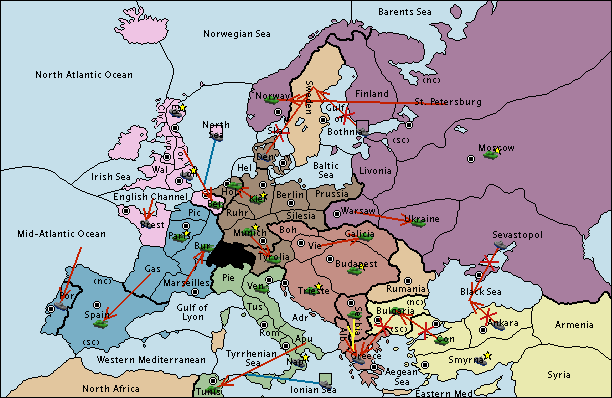
In Spring 1902, Turkey blocked my Lepanto fleet moves. My recollection of my thinking here is kind of hazy because this was a gunboat game from several years back, but I probably either anticipated that Turkey would block my move or else did not care whether Turkey blocked me or not.
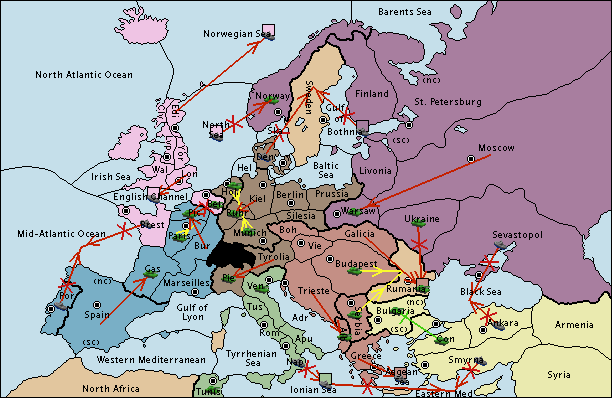
As you can see, Austria moved all of their pieces consistent with my gesture towards alliance. 5 out of 5 Austrian pieces moved (or supported moves) towards Turkey/Russia and away from me. Furthermore, Turkey and Russia were in no position to make attacks on Austria (Turkey’s fleets were stuck in their ports, and Russia’s natural acquisition of Rumania was disrupted by Austria’s aggression).
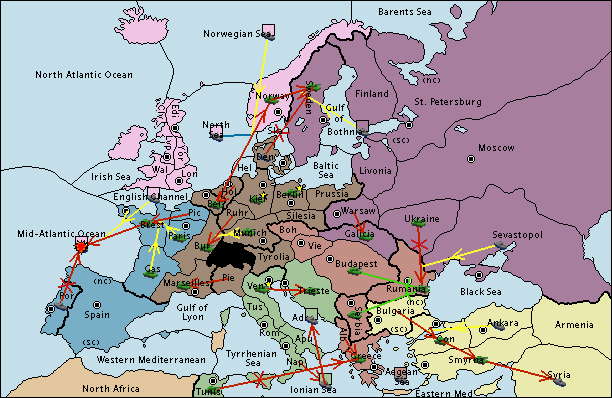
In case you are wondering, I could (and probably would) have made basically the same Autumn 1902 moves if Turkey had not bounced my fleet from moving to Eastern Mediterranean Sea in Spring 1901. All I would have needed to do is move a fleet at Eastern Mediterranean Sea to Ionian Sea (instead of moving Naples to Ionian Sea like actually I did).
FYI: The failed convoy move of Tunis to Greece was my effort to communicate my intention to continue attacking Austria. Since I had already decided to hold with Tunis, the failed convoy order came at no opportunity cost. In this example, the intention communicated by my failed convoy was probably redundant to my attack, but in general I think a failed convoy is a great communication tool on webDiplomacy (since the order produces a long, unmissable arrow arrow on the map).
Thus began my conquest of Austria.
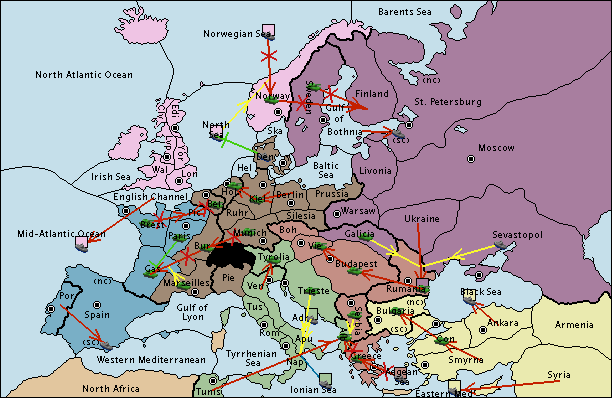
My successful convoy put all five of my units against against Austria. Meanwhile, Russia and Turkey had to spend turns getting into Rumania and Bulgaria (positions that Russia and Turkey typically occupy at the start of a match).
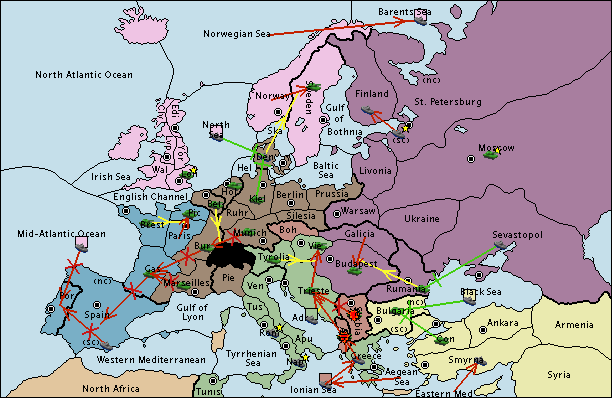
I guessed well on my follow-up attacks, and Turkey played defensively. Serbia was up for grabs at the end of 1903.
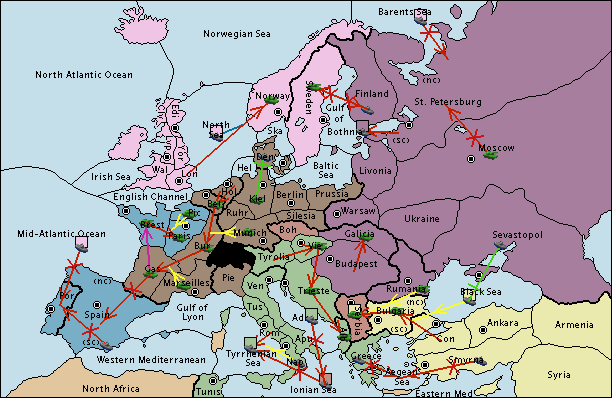
I managed to outguess Austria, Russia, and Turkey. Although Russia and Turkey managed to wordlessly coordinate an attack on Serbia, it was too late.
By the way, my incredible ability to intuit other players’ move choices is among the reasons I am such a formidable Gunboat Diplomacy player. Learn more about intuition by reading my gunboat journal, my essay on the role of luck in Diplomacy, and my article about tactics.
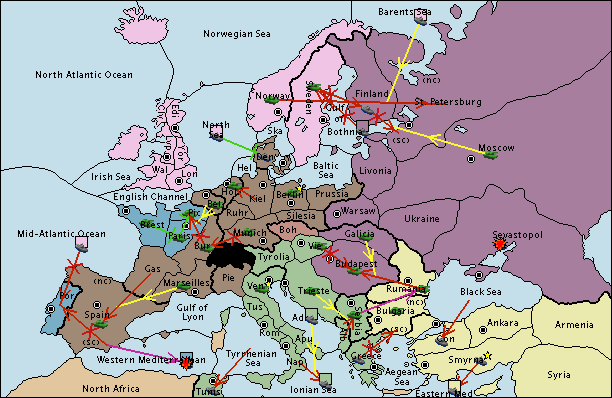
At the end of 1904, Austria was eliminated. Unlike so many disastrous attacks by Italy on Austria, I had acquired for myself four Austrian centers (Vienna, Trieste, Serbia, and Greece) while Turkey and Russia gained only two (Budapest and Rumania)—and arguably one of these (Rumania) was not much of a gain, since Rumania is considered by most to be Russia’s “natural neutral” center.
I’ll quickly summarize the rest.
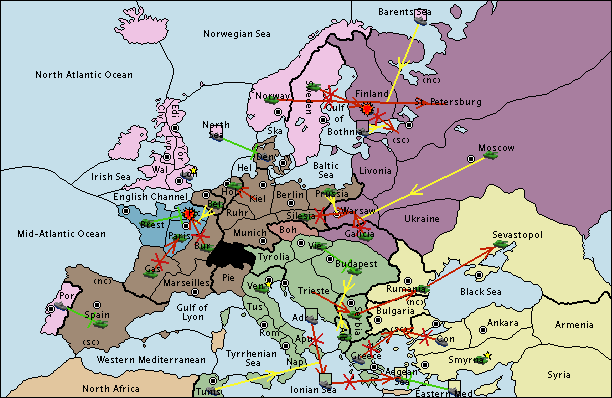
I proceeded to roll up the Balkans.
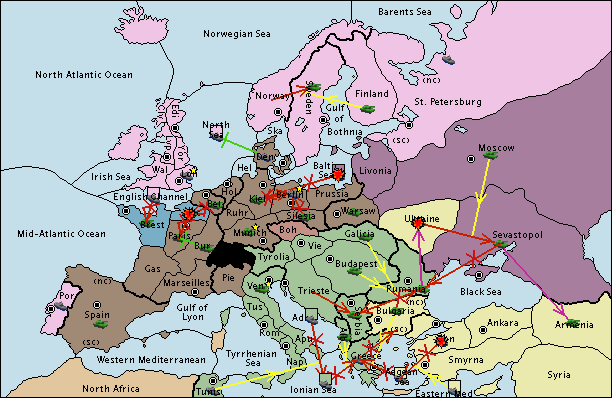
Turkey’s position collapsed.
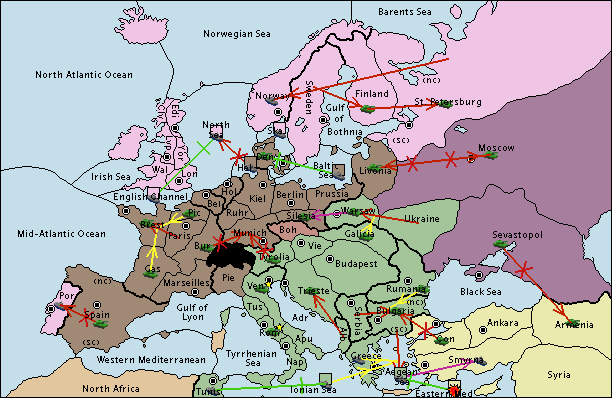
On Autumn 1907, I initiated war with Germany to attempt a solo win.
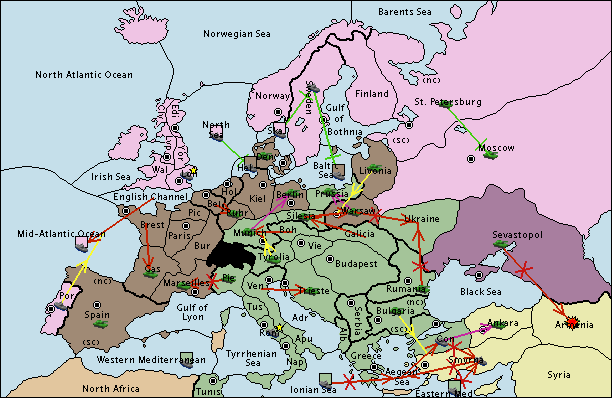
Things looked kinda promising in Autumn 1908. My conquest of Munich was a critical opportunity, as I needed at least 1 center “across the stalemate line” to reach 18. (Portugal, Spain, and St. Petersburg seemed well beyond my reach; I needed either Munich, Berlin, or Marseilles—plus Warsaw and Moscow.)
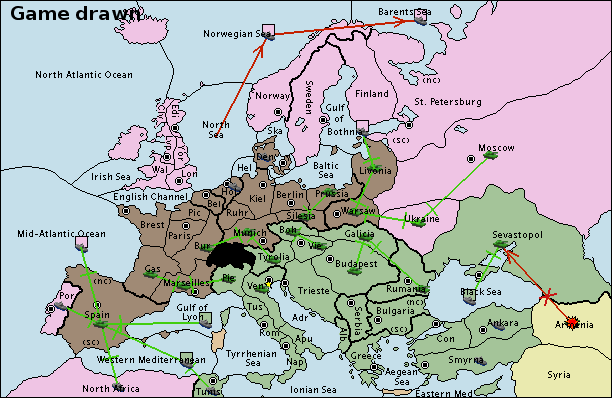
If England or Germany had misplayed, I might have won. However, Germany and England fought very well (as one would expect from a high-level match). We voted drawn on the Spring 1912 turn.
I ended the match with 15 centers and a respectable 3-way draw.
Why are Other Trojan Horse Duo Alliances Uncommon?
I consulted with a couple of experienced players before publishing this article, and we are in agreement that the most common fake alliance offers come from France (to England) and Italy (to Austria). Other fake duo alliances are rare because:
- A Trojan Horse ploy makes little sense or is even impossible between natural allies (distant powers that do not share borders), so an alliance involving natural allies is rarely a total sham.
- Most other alliances between neighbors do not require one players to move their pieces in such a way that they can be easily and immediately backstabbed by the other. In other words, there is little to gain (tactically) and much to lose (politically) by going through the effort of faking an alliance.
- For example, Turkey can usually get a fleet into Black Sea whether or not Turkey is allied to Russia, and Russia can typically put up the same defense whether or not Turkey lands a sucker punch on Russia. Attacking Russia by way of a Trojan Horse alliance gives minimal tactical advantage while paying an immense political cost (Russia may be permanently estranged or at least impervious to future manipulation; your rivals may judge you to be a pathological liar.)
- Most countries lack the tactical ability to invade and destroy a neighbor without cooperation from at least one other power. Interestingly, although France alone can overpower and conquer England, and Italy alone can (to a certain extent) overpower and conquer Austria, the reverse is not at all true.
- A unilateral English war against France is unlikely to be effective (because France has strong tactical defenses, and because England faces opportunity costs at Scandinavia if England commits against France without allies).
- A unilateral Austrian war against Italy is almost certainly a suicide attack (If Austria attacks Italy without securing a border with either Russia or Turkey by force or by agreement, those powers can basically walk into Austria’s centers).
Trojan Horse Triple Alliances
Another fairly common strategy is for two allies to pretend that they are both friendly towards their mutual target in order to manipulate their target into a position that will be easier to attack. This is basically the same ploy as a fake duo alliance, except that it involves two players faking that they are allied to a third player (who they intend to jointly attack). In my experience, the most common version is a fake “Western Triple” alliance.
The ploy begins when two of the three western powers (England, France, and Germany) decide to target the odd-one-out. To crush their target quickly, they lure their target into a defenseless position by each claiming to be friendly. One or both of them may even claim that they want to play the “Western Triple” alliance (a nigh-unbeatable but highly-unstable triple alliance).
Example #1: At the Sign of the Prancing Pony (Nov 2016—Dec 2016)

In this high-level match, I (England) and my ally France tricked Germany this way, resulting in a devastating attack on Germany. Germany never got even 1 build, and we eventually reached a 3 way draw with Turkey. You can read a little more about this match in another of my posts.
Example #2: ODC 2019 Round 1, Game 4 (Preliminaries) (Feb 2019—Apr 2019)
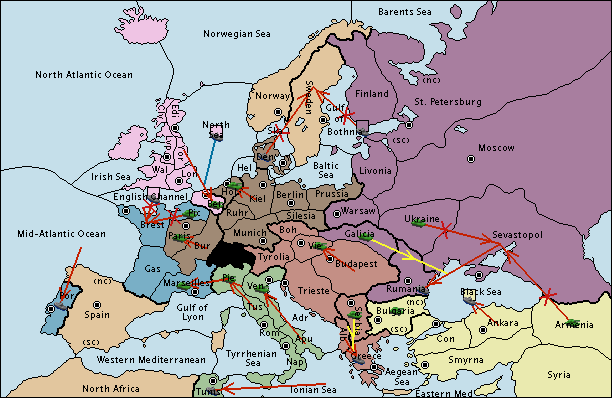
In this tournament match, I (England) and my ally Germany tricked France this way, resulting in a devastating attack on France. France never got even 1 build. I eventually attempted a solo win and came reasonably close to getting one. You can read all about this match in my journal.
By the way: are you sensing what a strong English opening might look like?
Why are Other Trojan Horse Triple Alliances Uncommon?
In my experience, fake triple alliances appear more often between England, France, and Germany than any other combination of powers. I believe this is so because:
- Again, a Trojan Horse ploy makes little sense or is even impossible between natural allies, so a triple alliance involving natural allies is rarely a total sham.
- Among the possible triple alliances between neighbors (which we might call “natural enemies”), Western Triple stands out as the strongest and most viable. Because the prospect of forming Western Triple is more credible and more appealing than, say, a triple alliance between Austria, Russia, and Turkey, a fake Western Triple offer is more likely to work.
To be clear, I am not saying that I think Western Triple is not a credible alliance offer; I am saying that Western Triple is the most common fake triple alliance because it is—by far—the most realistic triple alliance between neighbors.
Players rarely even offer the other triple alliances because such offers are so inherently suspicious (the alliance is unlikely to last long because the players will run out of room to expand). In other words, offers of an England-Germany-Russia triple alliance or an Italy-Austria-Turkey triple alliance are even less credible than an offer to play Western Triple—so non-credible that I have almost never offered or been offered such alliances.
The following triple alliances between three neighbors are most likely a ruse (or at least, unlikely to last long):
- Austria-Russia-Turkey (Austria is very likely the victim)
- England-Germany-Russia (The likely victim is England or Russia, but if this alliance lasts for a while then Germany is in the greatest danger in the long run.)
- Italy-Austria-Turkey (Turkey will most likely profit here, as Turkey will likely be able to unilaterally backstab Austria.)
The following triple alliances between three neighbors may not last until the end of the match, but have a reasonable probability of being sincere at the time they are formed.
- France-Germany-Italy (This rarely functions as a cooperative alliance in the first place; it is more like, Italy and France/Germany decide that they have better things to do than antagonize each other).
- Germany-Russia-Austria (Usually, Germany and Austria actively cooperate with Russia while ignoring each other. As the match develops, two of the three powers will probably decide to cut out the other. Even if one pair—Germany/Austria, Germany/Russia, or Russia/Austria—has a closer relationship and contemplates a backstab on the third partner later on, I do not think that such an alliance can be fairly called a “Trojan Horse,” since I am defining a Trojan Horse alliance as a disguised attack. Therefore, by definition, betraying any ally after cooperating with them for some time is not a Trojan Horse alliance.
Despite my cynical remarks, I will readily agree that every alliance is possible in Diplomacy. I cannot deny that truth, because I have witnessed the most unlikely of alliances.
But this is not an article about what is theoretically possible in Diplomacy; this article is about getting backstabbed and how to avoid it. Falling for a Trojan Horse ploy is among the ways you will get backstabbed. If you respond to offers of a triple alliance between three neighbors with skepticism and paranoia, you will definitely reduce your chances of getting backstabbed.
Eastern Shenanigans
One last remark on the makeup of fake alliances: in the Southern/Eastern area of the board (Italy, Austria, Turkey, Russia), it is fairly common for two of the four powers to form an early alliance against the other two. Tactically speaking, a head-on war between any combination of two-power alliances in that theatre results in very little being accomplished (I will not use the word “stalemate” here, because in Diplomacy a “stalemate” is a term of art. In everyday language, “stalemate” might mean “a really good defense” or “a waste of time” but in Diplomacy this word refers to a configuration of units that is not possible, even theoretically, to successfully attack).
To overcome this problem, at least one of the allied pair will feign a friendship with at least one of the two targets. To make the friendship ruse seem credible, the true allies will often feign hostility (or impending hostility) towards each other. By manipulating one of the two targets into attacking the other, the alliance can achieve the tactical jump-start they need to destroy their two targets.
“Trojan Horse” might not be right metaphor for this particular dynamic, but this article would feel incomplete to me if I did not describe this phenomenon.
Example: ODC 2019 Round 2, Game 3 (Semi-Finals) (Aug 2019—Nov 2019)
As you may recall from my previous entry in this series, I played as Italy in this match. Austria and I agreed to play the Italy/Austria alliance at the very outset of the match, and we never wavered from the commitment. But we knew that for our alliance to succeed quickly, we needed to prevent a Russian/Turkey counter-alliance from forming.
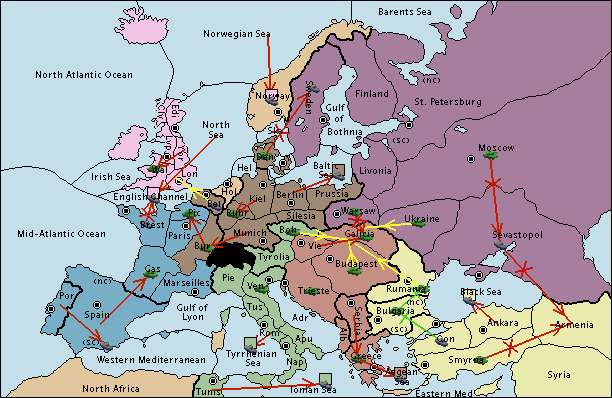
Coming in to Autumn 1902, I had promised almost every power (except for Austria, obviously) that I was about to attack/backstab Austria (like any good ally, I warned Austria that I was spreading disinformation in order to disguise our attack plan.) Previously in Autumn 1901, Turkey had built an army at Smyrna (instead of a fleet), most likely under a belief that I was about to attack Austria (or at least attack France—and definitely not Turkey).
At the same time, I believe that Austria attempted to gain Russia’s cooperation. (I can’t know for certain that this is true, but I have no reason to doubt the Austrian player’s word here.)
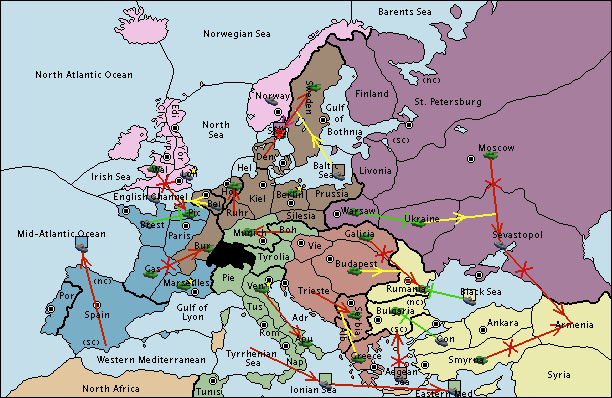
I feinted that I might attack France (my fleet was in Tyrrhenian Sea, which is anti-French), and claimed I was about to backstab Austria. I had the positions for doing either of those attacks; I could have moved my fleet to Gulf of Lyons and my army to Piedmont, or I might have nabbed Vienna and/or Trieste instead of moving my armies to Munich and Apulia. I deliberately created these possibilities to make it difficult for Turkey (or any other player for that matter) to read the board. (To learn more about how experienced players will make the board difficult to read, check out my article about the Strategic layer of Diplomacy.)
Thus, as depicted in the map above, I executed my Lepanto opening without Turkey blocking (or even being able to block) my moves. Meanwhile, no Russia/Turkey counter-alliance formed.
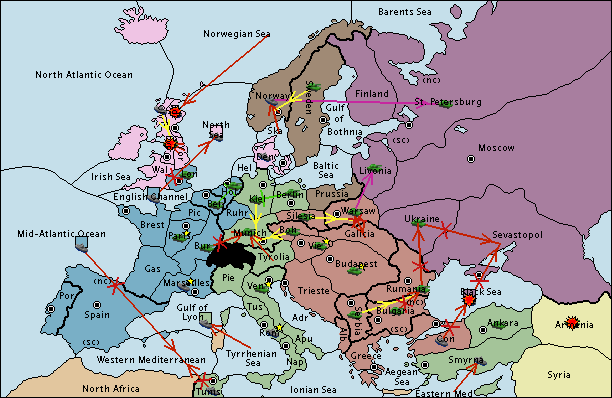
We proceeded to crush Turkey, and later Russia.
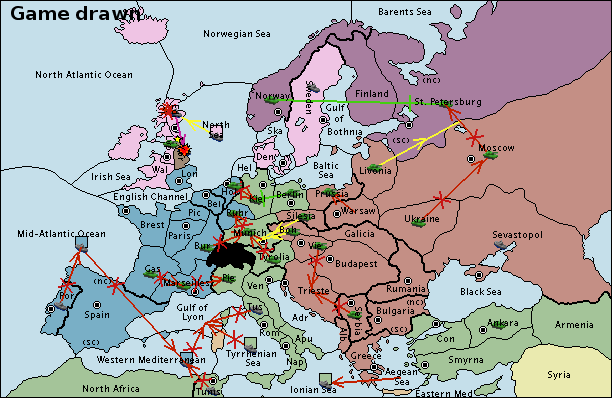
The draw votes were in, with this board, on Spring 1908.
I and my ally Austria concluded the match with a respectable 35/100 points apiece (the points were calculated according to Sum-of-Squares scoring).
Solution: Recognize Trojan Horses
To become good at Diplomacy, you need to develop your skill at detecting your rivals’ lies and manipulations. The best way to protect yourself from Trojan Horse alliance offers is to recognize them as such. If you fall for the trick, your position will probably be indefensible and you will be doomed. However, if you see through the ruse and correctly recognize that a hostile alliance is on your doorstep, you can take steps to protect yourself (such as: issue defensive orders with your pieces; form counter-alliances with other players; split off one of the alliance partners).

There are may be warning signs in a player’s press. These hints that someone is lying to you are called “tells.” I often call a player’s uncanny ability to sense that they are being lied to their “backstab Spider-Sense.”
In face-to-face Diplomacy, you can rely on the same social cues that apply to any game (or any social situation in general for that matter), such as facial expression, nervous body language, stressed voice, etc. There are many articles and books that teach you how to develop the techniques of spotting tells. If you want to learn more about that, I recommend starting off with content oriented towards spotting tells in Poker; the basics are the same for almost any game.
The challenge of detecting Trojan Horses is even greater when playing online Diplomacy, as your rivals’ physical bodies are not present to trigger your Spider-Sense. But even in online Diplomacy, there are tells:
The Offer is Too Good to be True
When a player promises to make concessions to you without putting effort into getting something from you in return (that is, without bothering to negotiate), they might be telling you what you want to hear because the offer of alliance is a Trojan horse. They don’t need to bother negotiating because they don’t intended to keep their promises anyways, and they’re hoping that by seeming so generous you will deem them to be a worthy ally. The bigger the lie they get you to believe, the more effective the backstab will be.
Suspicious Message Timing
A player who says very little to you, or suddenly sends many messages towards the end of the turn, is suspicious. Ask around to find out what kind of press other players are getting from that person. If other players are getting more frequent press than you, or detailed messages many hours or days before you do, that is a huge warning sign. The likely explanation is that the player’s press to you is an afterthought. Their press to you is an afterthought because their true allegiance lies elsewhere, and their offer of alliance is a Trojan Horse.
Last-Minute Offers
Combining the first two points, the most suspicious alliance offer of all is one that comes suddenly, mysteriously, and close to the end of the turn. When a player starts offering you what you want—especially concessions you did not even ask for—at the very end of the turn, and you can’t figure out why they would be agreeing to this, the situation is likely a trap.
They’re Just Too Nosy
Any ally who wants to know about all your moves is probably planning to backstab you (or help another rival attack you by leaking your orders). Your ally probably wants to know what all your moves will be so that they (and/or their co-conspirators) can counter all your moves. (To learn more about this, read about the turn I backstabbed my main ally in my ODC journal.)
Etcetera…
Of course, a successful Diplomat like Your Bored Brother knows about these tells—which means I know how to avoid giving myself away by them. My Trojan Horses, and other backstab intentions in general, are rarely sensed by my soon-to-be-backstabbed allies. (And even if they sense something is wrong, I have usually manipulated them into a tactical situation where they have no choice but to play out the match as my ally and hope for the best. More on that later in this series!)
Diplomacy players tend to be excellent liars. Even a lifetime of experience in lie-detecting will not help you catch them all. But the silver lining to a game within in infinite skill curve (like Diplomacy) is that you can always improve! If you haven’t already, read my series of articles on the Layers of Diplomacy; it’s all about how to see through lies!
There’s more to come!
So you’ve decided to adopt my advice: learn to spot Trojan Horses. But you know there’s more to avoiding backstabs than just detecting lies! After all, Your Bored Brother himself just said that he gets away with backstabbing players who see it coming!
Don’t worry! There will be three more entries in this series, each describing another one of the top 5 reasons players get backstabbed in Diplomacy—as well as how to avoid and overcome those problems in your own games!
